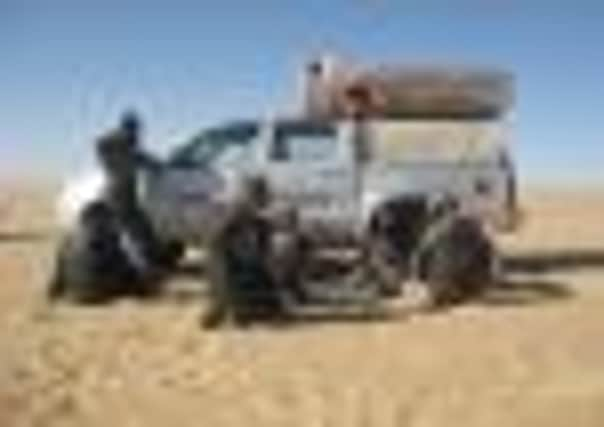Travel: desert safari in remotest Egypt


We were in the very south of Egypt’s Great Sand Sea, 500km from the nearest oasis, one of the planet’s most remote and inhospitable spots, and had to think quickly.
Our plight wasn’t life-threatening as we had other vehicles but this was, to put it mildly, a serious situation. The team, headscarves tightly wrapped against the blazing sun and fierce north wind, sat on the golden sand and decided what to do next.
Advertisement
Hide AdWe had been on the empty Sudan and Libyan border, hunting for stone-age cave paintings in Egypt’s remote south-west and three tyres had already blown out in spectacular style.


This was puzzling as well as worrying; they should have lasted for 100,000km but the desert’s sharp rocks had slashed them to pieces after only 40,000. This shouldn’t happen. I’ve been on several expeditions over the same ground and have never suffered a single blow out. And now, of our three vehicles, one was dead.
Our leader, Mahmoud, decided to leave the Hilux hidden in the immense dunes that surrounded us, push north to the nearest oasis, Siwa, and return with a new clutch.
The only suitable mechanic was contacted by sat-phone. He was eager to help but had no experience of desert driving, was based in Alexandria, 1000km away, and Egypt was undergoing a severe shortage of diesel. We crossed our fingers but had no idea of the time scale.
The area is notorious for armed bandits. In 2008, a group of Germans, Italians, a Romanian and eight Egyptian drivers and guides had been held hostage for ten days here by Sudanese gunmen.
Today people smugglers and drug dealers drive up from Chad and Sudan, while the return trip sees gunrunning.
Advertisement
Hide AdOn this year’s trip we were accompanied by six armed policeman, a police major and an army lieutenant, none of whom were sources of reassurance. In civvies and flip flops they looked as if they were going into town.
There was still time before we left the now-stripped Hilux for the major to demand that the stricken vehicle be towed up and down 500km of the world’s biggest dunes. Our Bedouin drivers laughed in his face.
Advertisement
Hide AdAs we toiled northwards, two smugglers’ 4x4s were on our left, following the course of the unmarked Libya-Egypt frontier. Again, our police escort didn’t appear to notice.
After two full days, we made it to the outskirts of Siwa, on the Libyan border and 300km from the Mediterranean.
The mechanic from Alexandria arrived in a Hilux with two young assistants and new clutch. They tried to set off at once, - unbelievably, the clutch on the new vehicle was burned out. Were we ever going to get out of here?
The decision was taken that Mahmoud with a Bedouin driver and the mechanics would all travel in a single vehicle without support. As his team departed, it wasn’t clear if we would see them again before our flights home.
It was at this point that Ove Östling, a professor at Malmo University, suggested we finish our trip in the Metropole Hotel, Alexandria, where they filmed the final scene of Ice Cold in Alex, with John Mills after an epic trip through this same desert, had enjoyed an ice-cold beer.
The breakdown had been on Monday and it was midday on Friday that Mahmoud returned to our desert campsite with the newly repaired Hilux. Trapped in soft sand, they had repeatedly dug themselves out, a further two tyres had blown, they’d been initially unable to locate the stricken vehicle and then found that their gas burner wouldn’t work. Tea, that indispensable desert tonic, had been made over a fire for which they had fortunately taken their own firewood.
Advertisement
Hide AdThe new clutch had not been the right size but the problem had been overcome. They were exhausted but triumphant. Mahmoud had been on his sat phone. “Six soldiers have been kidnapped by smugglers to the south,” he announced. “They want a prisoner exchange. This whole area is now closed to civilians!” Egyptian authorities would only confirm that “six soldiers are missing in a border area,” but we checked with civilians at their barracks and knew the true story. It was time to move.
The next day we made our way up the long road to the sea, a straight black line of asphalt slicing though a white dazzle of sand, stretching to the horizon.
Advertisement
Hide AdEven here there was trouble and we were stopped six times by military check points. At one a stressed teenage soldier asked us in Arabic “not to be upset, I am only doing my job,” before grabbing my passport and pretending to read the notes page. “This is the journey that doesn’t want to end,” sighed Mahmoud.
He was wrong. We arrived safely at Alexandria with about a cupful of fuel after 3500km.
Later that night Ove and I stayed at the Metropole. The bar has long since gone but that didn’t stop us cherishing our beers in a splendidly baroque antechamber - an environment a million miles from the desert.
Though usually only a military zone, it is likely that civilians won’t be allowed back into Egypt’s south-west for years. We don’t now what happened to the six missing soldiers but let’s hope that, like us, all’s well that ends well. We drank to that.